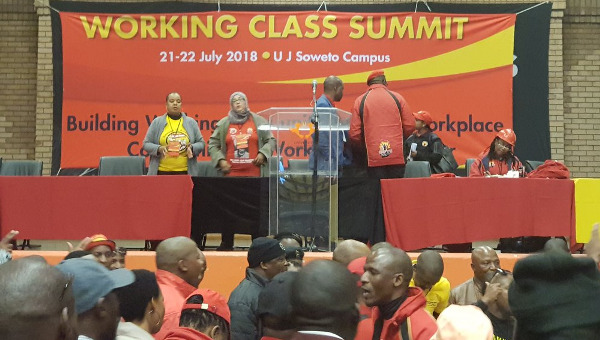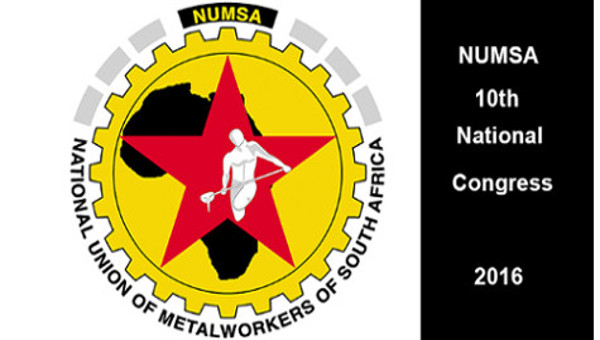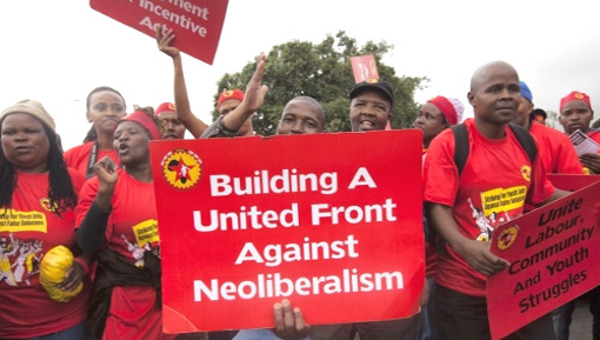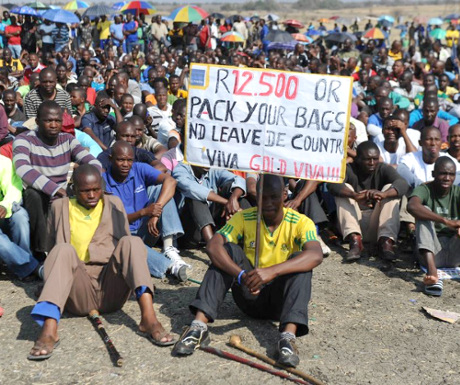Socialism at the Forefront of Numsa’s New Political Party
A socialist South Africa led by the working class – this is the vision of the newly registered political party, the Socialist Revolutionary Workers’ Party (SRWP). At the party’s two-day long pre-launch conference, which began on Friday at the Birchwood Hotel in Boksburg, over a thousand delegates from different parts of the country congregated to discuss, among other things, what it means to promote socialism in South Africa.
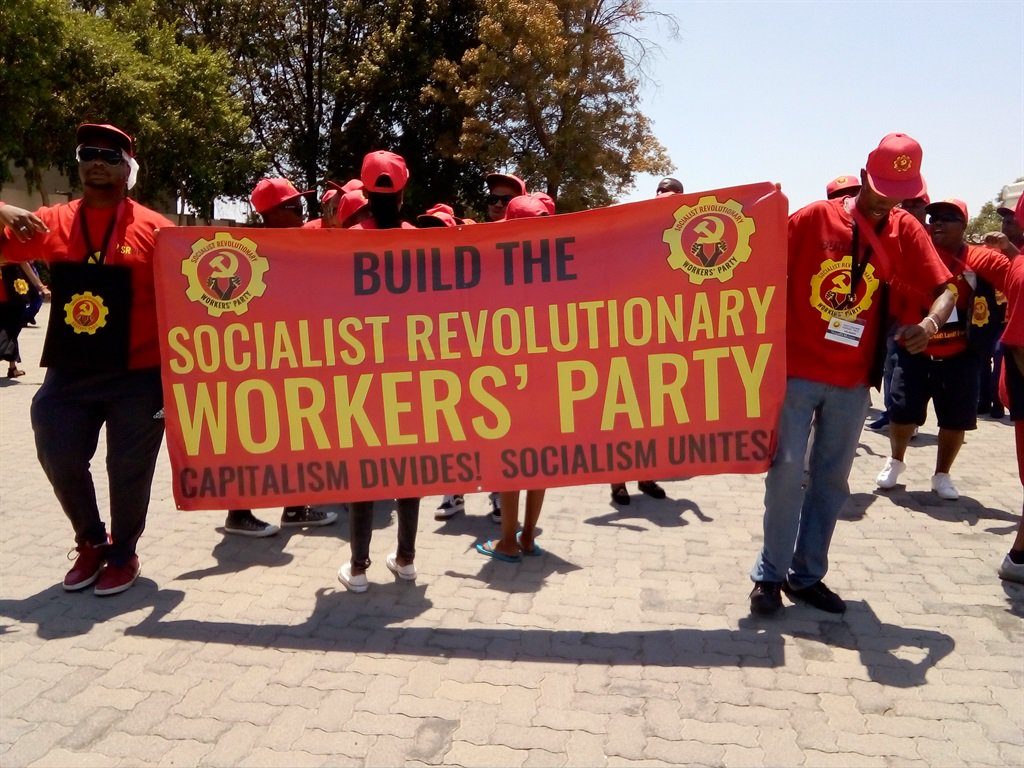
According to SRWP acting spokesperson Phakamile Hlubi-Majola, this was the party’s first national gathering since a decision was taken to establish the organization.
“This conference is an opportunity for us to get a sense of where we are in terms of the work that we have done over the last year. We will also speak about our values and general socialist principles of fighting for a society where land is owned by the working class, where the wealth is shared among us and where the mineral wealth of the country is owned by the people,” she said.
Needs of the Workers First
At a special national congress held by the National Union of Metalworkers of South Africa (Numsa) in 2013, the organization made the decision to start a political party that put the needs of the marginalized and most affected by issues like poverty and unemployment, first.
SRWP national convener, Irvin Jim, explained: “In 2013 the central committee of Numsa resolved that we must convene a special national congress to reflect on the fact that the country was on a downward spiral, but only the working class is affected,” he said.
“Workers then decided that the working class must organize itself by forming a worker’s party and, we were very clear at the time, that workers must also present a united front to champion their struggles. That is how the party came about.”
Hlubi-Majola, who is also Numsa’s spokesperson, added, “we had realised that the political system had failed the working class. It was then decided that Numsa would do the work to give birth to a worker’s party whose focus would be to drive the agenda for the working class in South Africa and fight capitalism.”
According to Jim, the pre-launch conference would see the party make decisions as a build-up to the formal launch, which will take place early next year. Jim, who is also Numsa’s secretary-general, said that he was happy with the party’s progress since Numsa’s decision.
“The party is growing fast and has a presence in all nine provinces. We have a sizeable number of national leadership and branches all over the country,” he said.
Jim said that the “party is registered and we are eligible to participate in the elections next year.” However, he wasn’t able to say if the party will contest the elections.
“As communists we have an old view that elections are not necessarily a solution, however, they are a tactic that can be explored to test if we have the support of the working class.”
Earlier this year, the Independent Electoral Commission (IEC) rejected the party’s application to register due to issues relating to its name and logo. But in November the SRWP’s registration was finally approved.
New Members
According to Jim, the party is made up of some members of the SA Federation of Trade Unions, members of the young nurse’s indaba trade union and members of the working class, who have come from other political parties.
Milo Semenya (48), a teacher in Klerksdorp and member of the SRWP, said that he was tired of a government that had not done enough for educators.
“I was a member of the SA Communist Party since 1990, but now I am a member of the SRWP. As educators we experience things like bullying from students, we lack resources and infrastructure. This is because the government is doing nothing to protect us or supply [us with] what we need,” he said.
“SRWP is my hope now. It represents us, the workers, those who work the hardest. I believe they will bring change.”
Earlier this week, former SABC chief operating office, Hlaudi Motsoaneng, launched his own political party, the African Content Movement (ACM), which he said would contest Cyril Ramaphosa’s presidency during the national elections next year. •
Palesa Dlamini writes for City Press, where this article first appeared.
Press Statement on the Pre-Launch Conference
(Birchwoods, 14-15 December)
The Socialist Revolutionary Workers’ Party (SRWP) held a two-day pre-launch conference in Birchwoods in Ekurhuleni. One thousand one hundred delegates representing all nine provinces gathered for the first national meeting of the party. The purpose of the meeting was to assess how far we have come in setting up structures for the party in all nine provinces, as well as to map a detailed party political strategy for 2019 and beyond.
Black people have been historically disposed, oppressed, dominated and racially marginalized by white supremacy through colonialism and Apartheid. It was through unity and a shared common vision that the working class defeated the Apartheid system. However, more than two decades after it was defeated, the racist Capitalist system has intensified the suffering of the working class. It has ensured wealth and riches for the elite minority, at the expense of the working class majority, and as a result South Africa is one of the most unequal societies in the world. More than half the population lives in abject poverty, caused by high levels of unemployment. We have learned hard lessons that the only way that the working class majority as a whole can be genuinely free and equal, is for us to destroy and dismantle the brutal Capitalist system, and replace it with the humane system of Socialism.
At our two-day conference we have resolved to intensify the work of uniting the working class locally and abroad, and to raising the levels of consciousness. The working class must lead and drive an agenda in its own interests. Furthermore, the Interim National Leadership will create a 2019 Elections Commission to organize and prepare us to contest the upcoming elections. The immediate task is to set up for the launching congress which will take place from the 22-24th of March 2019.
We depart from our Pre-Launch Conference determined not to fail the workers of the world in our struggle for a Socialist South Africa, Africa and Socialist World.
“No thieves, no traitors, no interventionists. This time, the revolution is for real!” — Fidel Castro.
Issued by Irvin Jim, SRWP National Convener, 15 December 2018.
All systems go for Numsa’s new political party, SRWP
Numsa Party Could be a Political Force
Tired of protesting from the sidelines against what it deems anti-poor, anti-worker policies, the National Union of Metalworkers of South Africa (Numsa) has registered its own political party.
The Socialist Revolutionary Workers’ Party (SRWP) is unlike any other formed out of disgruntlement with the ANC. While those failed to amass large support bases and build sustainable organizations, the SRWP enters the scene well resourced. It’s backed by a 300,000-strong trade union (SA’s biggest) and has ready-made constituencies across the country as a result.
However, the SRWP’s founders have a unique burden: while building the party from the ground up, they will have to fulfil the union mandate of protecting members’ rights in workplaces and ensure the sustained growth of the year-old SA Federation of Trade Unions (SAFTU).
Has Numsa Bitten off More than it can Chew?
The party has been on the cards since the 2013 Numsa special congress, at which the union denounced the ANC, decrying a “political vacuum” that left the working class on its own. But a lot has changed since then.
A Congress of South African Trade Unions (Cosatu) survey of the political sentiments of its shop stewards at the time found that more than 60% wanted the federation to start its own political party. But a similar study conducted today could turn up different results, given the extent of public servant support.
Political analyst Ebrahim Fakir points to a dual trend in the SA labour market: a falling number of workers, especially in manufacturing, where Numsa has a stronghold; and declining trade union density.
Fakir concedes, though, that there are constituencies in SA with a liking for the socialist politics the SRWP advocates. “[The party] will find some resonance because of huge income inequality and because all the other parties are terrible,” he says.
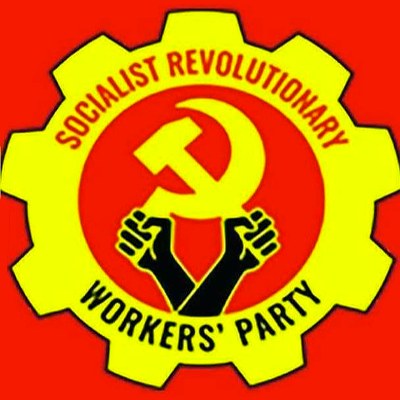
SRWP spokesperson Phakamile Hlubi-Majola says: “Most of the political parties which dominate the SA political landscape promote capitalism, and some of them want to reform the system. We are the only ones fighting for the total destruction of capitalism. We want a socialist SA, where the interests of the working class will be primary and the wealth of the country will be used for the benefit of all.”
It’s likely, then, that the SRWP will have to wrestle with the likes of the Economic Freedom Fighters (EFF) for electoral support, should it decide to contest the 2019 elections. That decision – and a call on whether it will co-operate with other political parties – will be dealt with at its inaugural congress next month.
There are other concerns to be addressed. For a start, Numsa’s 2016 congress resolved that “Numsa will remain a union and will not turn itself into a political party.” Yet, in the same breath, the union committed its shop stewards and officials to maintaining an activist role and “[taking] responsibility for the party we are building.”
Hlubi-Majola explains this seeming contradiction by arguing that Numsa “will always maintain its character as a trade union and will continue to fill this role. SRWP is a party for all the working class, including Numsa members, who want to unite to fight and defeat capitalism.”
But Haroon Bhorat, professor of economics and director of the Development Policy Research Unit at the University of Cape Town, asks: “Where does Numsa end and the new political party begin?”
“My bigger concern is the trajectory of the union movement … To what extent have unions become too politicized and not ‘workerist’ enough? The role of a trade union is to represent worker interests, but have they overrepresented themselves in politics?”
There is also uncertainty about how Numsa members will enjoy their constitutionally enshrined right to support political parties of their choice when resolutions bind their allegiance to the SRWP.
What it Means
If the Socialist Revolutionary Workers’ Party contest next year’s elections, it will battle it out with the left-leaning EFF.
At its 2013 congress, the union emphasized individual members’ freedom to campaign for the ANC, or any other political organization, after it decided not to endorse the ruling party. But in 2016 it decided officials and shop stewards would have to recruit and mobilize for the new party.
Trade unions in SA are synonymous with party politics, given their shared history in the liberation struggle. Cosatu has been in an alliance with the ANC and SACP since 1990. But that has come at a cost: the federation’s proximity to the ruling party has not given it the political leverage to drive through its policy proposals, including the banning of labour brokers and the realisation of socialism.
This is the mantle the SRWP now wants to assume. It’s not the only party to try this. The Workers & Socialist Party (WASP) was formed by the Democratic Socialist Movement after the 2012 Marikana massacre.
WASP general secretary Weizmann Hamilton tells the FM that the SRWP will widen division among workers, because the greatest challenge facing the working class is “not a shortage of militancy but unification.”
He says: “The missing ingredient is the unification of all these forces, because it’s all about the same issues: anticorruption, poverty and low wages.”
While time will tell whether the SRWP will occupy a prominent role in SA’s political landscape, the most immediate challenge for Numsa appears to be how to ensure its worker and political interests co-exist without compromising each other. •
Theto Mahlakoana writes for Business Live/Financial Mail where this article was first published.


